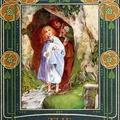CHAPTER 23, part 4
'It's difficult, you know, father, inside the mountain, especially in the dark, and not knowing what turns you have taken, to tell the lie of things outside.' 'Impossible, my boy, without a chart, or at least a compass,' returned his father. 'Well, I think I have nearly discovered in what direction the cobs are mining. If I am right, I know something else that I can put to it, and then one and one will make three.' 'They very often do, Curdie, as we miners ought to be very well aware. Now tell us, my boy, what the two things are, and see whether we can guess at the same third as you.' 'I don't see what that has to do with the princess,' interposed his mother. 'I will soon let you see that, mother. Perhaps you may think me foolish, but until I am sure there, is nothing in my present fancy, I am more determined than ever to go on with my observations. Just as we came to the channel by which we got out, I heard the miners at work somewhere near--I think down below us. Now since I began to watch them, they have mined a good half-mile, in a straight line; and so far as I am aware, they are working in no other part of the mountain. But I never could tell in what direction they were going. When we came out in the king's garden, however, I thought at once whether it was possible they were working towards the king's house; and what I want to do tonight is to make sure whether they are or not. I will take a light with me--' 'Oh, Curdie,' cried his mother, 'then they will see you.' 'I'm no more afraid of them now than I was before,' rejoined Curdie, 'now that I've got this precious shoe. They can't make another such in a hurry, and one bare foot will do for my purpose. Woman as she may be, I won't spare her next time. But I shall be careful with my light, for I don't want them to see me. I won't stick it in my hat.' 'Go on, then, and tell us what you mean to do.' 'I mean to take a bit of paper with me and a pencil, and go in at the mouth of the stream by which we came out. I shall mark on the paper as near as I can the angle of every turning I take until I find the cobs at work, and so get a good idea in what direction they are going. If it should prove to be nearly parallel with the stream, I shall know it is towards the king's house they are working.' 'And what if you should? How much wiser will you be then?' 'Wait a minute, mother dear. I told you that when I came upon the royal family in the cave, they were talking of their prince--Harelip, they called him--marrying a sun-woman--that means one of us--one with toes to her feet. Now in the speech one of them made that night at their great gathering, of which I heard only a part, he said that peace would be secured for a generation at least by the pledge the prince would hold for the good behaviour of her relatives: that's what he said, and he must have meant the sun-woman the prince was to marry. I am quite sure the king is much too proud to wish his son to marry any but a princess, and much too knowing to fancy that his having a peasant woman for a wife would be of any great advantage to them.'

